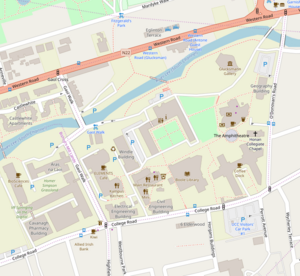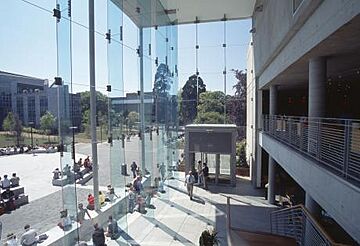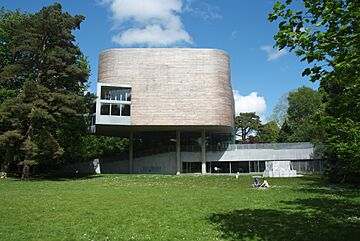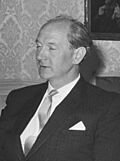University College Cork facts for kids
|
Coláiste na hOllscoile, Corcaigh
|
||||||||
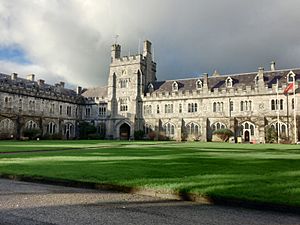 |
||||||||
|
Former name
|
Queen's College, Cork | |||||||
|---|---|---|---|---|---|---|---|---|
| Motto | Where Finbarr Taught Let Munster Learn | |||||||
| Type | Public university | |||||||
| Established | 1845 | |||||||
| Founder | Queen Victoria | |||||||
| President | John O'Halloran | |||||||
|
Academic staff
|
965 | |||||||
| Students | 24,195 (2021–22) | |||||||
| Undergraduates | 16,849 (2021–22) | |||||||
| Postgraduates | 7,346 (2021–22) | |||||||
| Location |
,
Ireland
51°53′35″N 8°29′35″W / 51.893°N 8.493°W |
|||||||
| Colours |
|
|||||||
| Affiliations | AUA EUA NUI IUA UI Utrecht Network |
|||||||
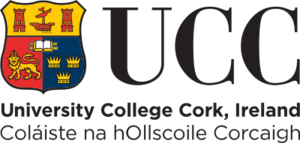 |
||||||||
University College Cork (UCC) is a large university in Cork, Ireland. It is part of the National University of Ireland system. People usually just call it UCC.
UCC was started in 1845 as one of three "Queen's Colleges." These colleges were also in Belfast and Galway. Over the years, its name changed a few times. In 1908, it became University College, Cork. Later, in 1997 and 1998, its official name became University College Cork – National University of Ireland, Cork.
UCC has won many awards. The Sunday Times named it "Irish University of the Year" five times, most recently in 2017. In 2015, it was recognized as a top university by the U-Multirank system, getting many "A" scores. UCC was also the first university to get a special award for managing its energy well in 2011.
Contents
A Look Back: UCC's History
Queen's College, Cork, was founded by Queen Victoria in 1845. She wanted to create new colleges to help learning in Ireland. The colleges in Belfast, Cork, and Galway officially opened on December 30, 1845. UCC welcomed its first students in 1849 with 23 teachers and 181 students. The first subjects taught were Medicine, Arts, and Law.
The university's location was chosen because it was thought to be connected to Saint Finbarr, the patron saint of Cork. His old monastery and school were nearby. The university's motto, "Where Finbarr Taught, Let Munster Learn," shows this connection.
The main buildings, including the beautiful Tudor Gothic quadrangle, were designed by Sir Thomas Deane and Benjamin Woodward. Queen's College Cork officially opened in November 1849. More buildings were added later, like the Medical/Windle Building in the 1860s.
Becoming Part of the National University
In 1908, the National University of Ireland was formed. This new university included colleges in Dublin, Cork, and Galway. Queen's College, Cork, then became University College, Cork. Later, in 1997, it became a full university within the National University system.
UCC Today: Campus and Students
As of 2022, University College Cork (UCC) had over 24,000 students. This included more than 16,000 undergraduate students and over 7,000 postgraduate students. About 3,400 staff members work at the university, helping students learn and do research. UCC also has around 200,000 former students all over the world.
Exploring the Campus
Since the late 1980s, more and more students have joined UCC. This led to the campus growing a lot! New buildings were added, and old ones were made better. Some important additions include the Alfred O'Rahilly building, the Cavanagh Pharmacy building, and the Brookfield Health Sciences centre.
The Lewis Glucksman Gallery, an art gallery, opened in 2004. The Boole Library was also expanded. It is named after George Boole, UCC's first professor of mathematics. He created the special math that helps make computer programming possible! In 2009, the Western Gateway Building opened. In 2016, UCC also bought the Cork Savings Bank building in Cork City.
The School of Biological, Earth and Environmental Sciences and the School of Applied Psychology are located on the North Mall Campus.
In 2006, the university reopened the Crawford Observatory. This observatory was built in 1880 by Sir Howard Grubb, who designed and built the telescopes. The university worked hard to restore the building and its three main telescopes.
In November 2009, some UCC buildings were damaged by floods. The university had to close for a week to clean up. The newly opened Western Gateway Building was especially affected.
In 2018, UCC's campus became home to Ireland's first "plastic free" café. This café, called Bio Green Café, is in the Biosciences building.
Amazing Research at UCC
UCC is one of Ireland's top places for research. It gets a lot of money for its research projects. In 2016, UCC received over €96 million for research.
The university has "Centres of Excellence" where researchers work on important topics. These include:
- Nanoelectronics: Working with the Tyndall Institute on tiny electronic devices.
- Food and Health: Researching how food affects our health.
- Environment: Studying things like biodiversity, energy, and ocean power.
- Business Information Systems: Looking at how technology helps businesses.
In 2009, UCC was ranked among the top 3% of universities worldwide for its research. The Sunday Times "Good University Guide 2015" also ranked UCC first for "research income per academic."
UCC also has companies that grew out of its research. These "campus companies" include Cytrea (pharmaceuticals), Firecomms (optical communications), and Alimentary Health (healthcare).
Special Events and Celebrations
In 2015, UCC celebrated the 200th birthday of George Boole, its first math professor. In 2017, UCC announced a big plan to invest €350 million. This plan aims to improve teaching, welcome more students, expand the campus, and get more donations.
The National Famine Commemoration was held at UCC in 2018. Cork University Press, which is part of UCC, published The Atlas of the Great Irish Famine in 2012. They also published The Atlas of the Irish Revolution in 2017.
UCC's Reputation and Rankings
| Global rankings | |
|---|---|
| ARWU (2020) | 301–400 |
| QS (2021) |
246 |
| THE (2021) | 351–400 |
University College Cork is known for being a great university. The Sunday Times named it "Irish University of the Year" in 2003, 2005, 2011, and 2016. In 2015, it was a top performer in the U-Multirank system.
The 2011 QS World University Rankings gave UCC a 5-star rating. They also ranked UCC among the top 2% of universities worldwide. In 2015, UCC's Pharmacy & Pharmacology subjects were listed among the top 50 worldwide.
UCC also does a great job with sustainability. The Universitas Indonesia (UI) Greenmetric World University Ranking placed UCC second in the world in 2015 for its efforts to be environmentally friendly.
UCC was one of the first places in Ireland to have a website in 1991. It was only the ninth website in the world at that time!
What You Can Study: Academic Areas
College of Medicine and Health
Medicine was one of the first subjects taught at UCC when it opened in 1849. The medical buildings were built between 1860 and 1880. The medical school quickly became known for its excellent graduates. The first two women to graduate in medicine in Ireland did so from UCC in 1898. This was very special because women were not allowed to study medicine at the University of Oxford until much later.
UCC's School of Medicine is part of the College of Medicine and Health. It works closely with the University College Cork Teaching Hospital, which is the largest medical center in Ireland. The UCC School Of Pharmacy is in the Cavanagh Pharmacy Building.
Centre for Architectural Education
The Cork Centre for Architectural Education (CCAE) is UCC's Department of Architecture. It is run together with Munster Technological University. It is approved by the Royal Institute of the Architects of Ireland.
Humanities and Arts
The College of Arts, Celtic Studies and Social Sciences (CACSSS) includes many different schools.
UCC has the Irish Institute of Chinese Studies. Here, students can learn about Chinese culture and language. The department won the European Award for Languages in 2008.
Digital Humanities is a growing area at UCC. Students can study how technology and digital tools are used in arts and humanities.
Life as a UCC Student
Clubs, Societies, and Student Voice
University College Cork has over 100 active societies and 50 different sports clubs! There are groups for almost every interest, from academics and charity work to gaming, politics, and religion. Sports clubs include field sports, martial arts, water sports, and team sports. Bank of Ireland sponsors UCC clubs, and the UCC Skull and Crossbones is the mascot for all UCC sports teams. In 2010, 100 students received scholarships for 26 different sports.
UCC's societies do a lot of good work, including charity. For example, the Surgeon Noonan society raises over €100,000 every year. The War Gaming and Role Playing Society (WARPS) raises €10,000 through its gaming convention, Warpcon.
An Chuallacht (meaning "the fellowship") is UCC's Irish language and culture society. It was founded in 1912 and promotes the Irish language. It won the Glór na nGael "Irish Society of the Year Award" in 2009.
The UCC Students' Union (UCCSU) represents all 17,000 students at UCC. Every student is automatically a member. The university also has its own student-run radio station, "UCC 98.3FM."
Where Students Live: Accommodation
UCC offers accommodation for students through a company called Campus Accommodation UCC DAC. UCC has five accommodation complexes, including the Castlewhite Apartments and Mardyke Hall.
In February 2020, UCC announced that rent for university-owned accommodation would increase. This decision led to protests from students, staff, and local politicians. The UCC Students' Union started a campaign against the increase. UCC explained that the increase was needed for building repairs and higher security costs.
Students from Around the World
In 2010, UCC had 2,400 international students. Most of them came from the United States, China, France, and Malaysia. UCC also takes part in the Erasmus program, which allows students to study abroad.
A survey in 2008, called the International Student Barometer report, showed that international students at UCC were very happy. 98% of them said they had "Expert Lecturers," and over 90% said they had "Good Teachers." UCC was also ranked in the top three for its "sports facilities," "social facilities," and "university clubs and societies."
In 2023, a student named Diana Vicezar started a podcast about the experiences of Hispanic and Latin-American students in Ireland while studying at UCC.
Famous People Who Studied at UCC
Many famous people have studied at University College Cork in different fields.
- Arts and Literature: These include novelist Seán Ó Faoláin, actress Fiona Shaw, and poets like Paul Durcan. Actor Cillian Murphy and BBC presenter Graham Norton also attended UCC.
- Business: Important business leaders like Denis Brosnan from Kerry Group studied here.
- Medicine and Science: Alumni include physician Charles Donovan and physicist Professor Margaret Murnane. In mathematics, Seán Dineen and Des MacHale are notable.
- Politics: Former Taoiseach (Prime Minister of Ireland) Jack Lynch and current politician Micheál Martin are UCC alumni.
- Religion: Bishops like Paul Colton and Raymond Browne studied at UCC.
- Sport: Rugby coach Declan Kidney, Gaelic footballers Séamus Moynihan and Maurice Fitzgerald, and rugby players Ronan O'Gara and Donnacha Ryan are among the sports stars who attended UCC.
Important Teachers at UCC
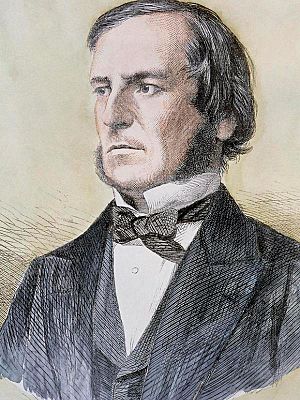
- George Boole was the first professor of mathematics at UCC. He created Boolean algebra, which is super important for computer programming.
- Aloys Fleischmann was a famous composer and musicologist who taught music from 1934 to 1980.
- Mary Ryan was the first woman in Ireland or Great Britain to become a university professor. She taught romance languages at UCC.
- J.C. Séamus Davis is a Professor of Quantum Physics.
List of Presidents
Here are some of the people who have led UCC as president:
- 1845 to 1873: Sir Robert Kane; the very first president
- 1904 to 1919: Bertram Windle
- 1943 to 1954: Alfred O'Rahilly
- 1999 to 2007: Gerard Wrixon
- 2007 to 2017: Michael Murphy
- 2017 to 2020: Patrick G. O'Shea
- 2021 to Present: John O'Halloran
UCC's Coat of Arms
|
UCC has its own special coat of arms. It was given to the university on March 27, 1889. The motto, "Where Finbarr Taught Let Munster Learn," is also on the coat of arms.
More to Explore
See also
 In Spanish: Universidad de Cork para niños
In Spanish: Universidad de Cork para niños


